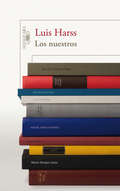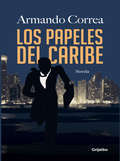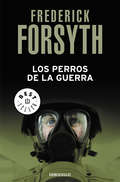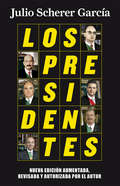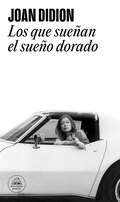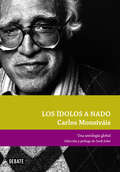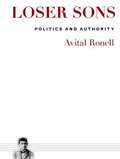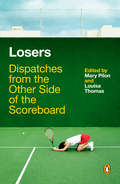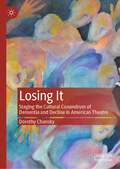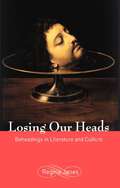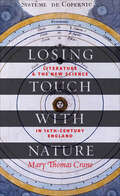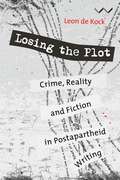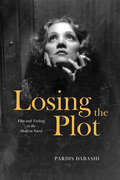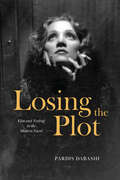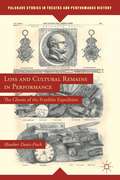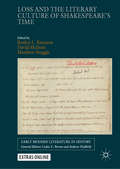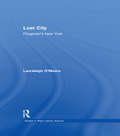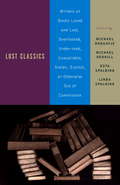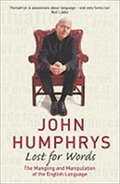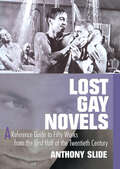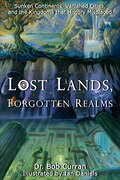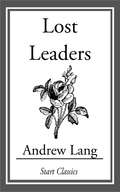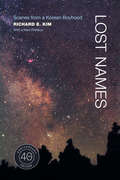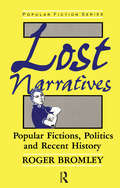- Table View
- List View
Los nuestros
by Harss, LuisEl minuto uno del Boom. La foto fija que anticipó un fenómeno literario sin precedentes en nuestra lengua. En el año 1964, Luis Harss emprendió un viaje por Francia, Italia, México y por todo el continente americano con el fin de trazar el retrato literario y psicológico de quienes consideraba los diez autores latinoamericanos más representativos del momento. Borges, Asturias, Guimarães Rosa, Onetti, Cortázar, Rulfo, Fuentes, García Márquez y Vargas Llosa «posaron de buena gana». El resultado de esta aventura honesta y desinteresada fue que, sin proponérselo ni adivinar lo atinado de su predicción, Harss creó el canon y la carta de navegación de un fenómeno aún incipiente que más tarde se llamaría Boom. «La década del sesenta puede muy bien ser un momento decisivo. Nuestra novela está todavía a prueba. Es demasiado pronto para saber si las pocas figuras realmente notables que asoman en las penumbras son una casualidad o una promesa. Pero si la diferencia entre un accidente y una tradición está en el encadenamiento del esfuerzo común, el futuro se ve propicio. Hoy por primera vez nuestros novelistas pueden aprender los unos de los otros. Cada cual hace su camino propio, pero forma parte de un mismo universo de la imaginación. Hay acumulación y el comienzo de una continuidad. En este sentido podemos hablar del verdadero nacimiento de una novela latinoamericana.»Luis Harss, 1966
Los papeles del Caribe
by Armando CorreaLa trama de esta novela gira en torno a las relaciones quesostuvieron la CIA y la DEA con el general Noriega para facilitarel lavado de dineros del narcotráfico en su país.En los años 80, durante su periodo como director de laDEA, Frederick McLean, vicepresidente de los Estados Unidosy candidato a la Presidencia, avala el acercamiento deesta agencia con el gobierno de Noriega para poner enmarcha un proceso de lavado de dineros provenientes delnarcotráfico, mediante un complejo sistema de triangulaciónbancaria. El propósito de esta negociación es acallar lasacusaciones de la oposición panameña sobre las relacionesdel general con la mafia colombiana y legitimar su inmensafortuna, con el fin de mantenerlo como aliado en el poder yfortalecer la presencia norteamericana en la región.Sin embargo, una investigación adelantada 20 años más tardepor un senador norteamericano pone al descubierto eloscuro entramado que llevará al general Noriega a prisióny acabará con la carrera política del vicepresidente McLean
Los perros de la guerra
by Frederick ForsythEn primer plano, una anécdota de trepidante acción descubre algunos aspectos siniestros y poco conocidos de ciertas actividades: minería, altas finanzas, operaciones bancarias y el mundo de los traficantes de armas. De París a Ostende y Marsella, donde son reclutados los mercenarios; de Berna a Brujas, donde se montan las operaciones financieras; y de Alemania a Italia, Grecia y Yugoslavia, donde se compran las armas; Forsyth devela, en un viaje literario apasionante, un mundo en el que no sólo las armas, sino quienes las disparan, se venden al mejor postor.
Los presidentes (nueva edición): Nueva edición aumentada, revisada y autorizada por el autor
by Julio Scherer GarcíaLos presidentes es resultado del oficio periodístico de Julio Scherer, de su talento literario y de la cavilación profunda acerca de cómo son por dentro los gobernantes mexicanos. En 1986 Julio Scherer publicó un libro destinado a convertirse en un clásico del periodismo político y literario: Los presidentes. A casi tres décadas de su publicación, esta nueva edición aumentada y actualizada es el más elocuente homenaje a su autor, fallecido a principios de 2015. Esta actualización procede principalmente de otros libros del autor, e incluye un anexo, "Las casas de los presidentes", basado en reportajes de la revista Proceso que Julio Scherer fundó y dirigió. Julio Scherer escribió este libro magistral convencido de que "eran muchos los crímenes contra la nación y eran pocos los que se atrevían a descorrer el velo que cubría a nuestros presidentes". Recurriendo a su "terca memoria", en esta páginas magistrales recuerda hechos, conversaciones, encuentros y desencuentros que tuvo con ellos -Díaz Ordaz, Echevarría, López Portillo y Miguel de la Madrid en la primera edición, a los cuales ahora se añaden Salinas, Zedillo, Fox y Calderón-, pero al mismo tiempo reflexiona sobre la condición humana de estos mandatarios. Así, Los presidentes es resultado del oficio periodístico, del talento literario y de la cavilación profunda acerca de cómo son por dentro los gobernantes mexicanos. Otro tema central de este libro es la libertad de expresión frente al poder presidencial, e igualmente se confrontan todos los tópicos asociados al ejecutivo en turno: el dedazo, la adulación incondicional, el control de la prensa y la corrupción, los cuales parecen repetirse ad infinitum en este sistema priista que sigue vigente. En esta nueva edición se reproduce un texto de Scherer, escrito en 2014, cuyo foco es el actual presidente, Enrique Peña Nieto, a quien ve comportándose como todos los demás, lo que resulta todavía más grave por todo el tiempo transcurrido, a lo largo del cual los gobernados han tenido que soportar los embates de este nefasto presidencialismo.
Los que sueñan el sueño dorado
by Joan DidionUna antología de los mejores artículos y ensayos de la periodista y escritora Joan Didion. «En la tierra dorada el futuro siempre es atractivo, porque nadie recuerda el pasado.» Joan Didion es una de las cronistas fundamentales de la segunda mitad del siglo XX. En una edición a cargo de Claudio López de Lamadrid, Los que sueñan el sueño dorado reúne por primera vez en castellano una selección de artículos y ensayos de sus libros Arrastrarse hacia Belén, un clásico moderno sobre la vida en la Norteamérica de los años sesenta y especialmente sobre el centro de la contracultura, California; El álbum blanco, un mosaico de los años sesenta y setenta que incluye episodios vagamente autobiográficos; Después de Henry, donde Joan Didion nos advierte sobre las fantasías que los medios de comunicación construyen en torno a las víctimas de crímenes violentos; Salvador, que dibuja un retrato de los horrores cometidos en ese país y su estrecha relación con la política exterior de Estados Unidos, y Miami, donde reflexiona acerca de la inmigración y el exilio, y la pasión, la hipocresía y la violencia políticas. Todos ellos conforman una visión crítica y literaria fundamental para entender la sociedad norteamericana actual.
Los ídolos a nado: Una antología global
by Carlos MonsiváisLa mejor antología del maestro de la crónica. Carlos Monsiváis era a partes iguales figura mediática, escritor popular e intelectual imprescindible. Autor de una obra tan amplia como fascinante, inventó una forma de contar la realidad y dotó a la crónica y al ensayo periodístico de verdadero calado literario, como prueban las páginas que conforman esta antología, seleccionada por Jordi Soler en conversación con el propio Monsiváis. El título, Los ídolos a nado, un verso de Ramón López Velarde, lo eligió Monsiváis, quizá por su misteriosa sonoridad, y también porque contiene esa imagen poderosa que sugiere lo que esta antología pretende: cruzar el mar y traer a España la obra de uno de los escritores imprescindibles de la lengua. Reseñas:«En su Autobiografía, que publicó a los veintiocho años, Monsiváis declaró: "Acepté esta suerte de autobiografía con el mezquino fin de hacerme ver como una mezcla de Albert Camus y Ringo Starr". La distancia que hay entre el autor de El extranjero y el más cachondo de los Beatles es el espacio por el que transita la vena más literaria de Monsiváis, y también la más global, esa zona de su obra que es el motivo de esta antología.»Jordi Soler «Monsiváis ha hecho de la crónica un género monumental y una particular metafísica, la de la atención aristotélica y cuidadosa por lo menor que nos ocurre. Si no fuera por su arrojo, nadie detallaría con respeto, sagacidad y olfato las oscuras trampas de aquella realidad desequilibrada.»E. López Parada «Una de las voces más lúcidas e implacables de la literatura mexicana.»El País
Loser Sons: Politics and Authority
by Avital RonellThere are sons who grow up unhappily believing that no matter what they do, they cannot please their fathers. Often unable to shed their sense of lifelong failure, either they give up and suffer in a permanent sulk, or they try with all their might to prove they are worth something after all. These are the "loser sons," a group of historical men as varied as President George W. Bush, Osama bin Laden, and Mohammed Atta. Their names quickly illustrate that not only are their problems serious, but they also make serious problems for others, expanding to whole nations. When God is conceived and inculcated as an angry and impossible-to-please father, the problems can last for generations. In Loser Sons, Avital Ronell draws on current philosophy, literary history, and political events to confront the grim fact that divested boys become terrifying men. This would be old news if the problem didn't recur so often with such disastrous consequences. Looking beyond our current moment, she interrogates the problems of authority, paternal fantasy, and childhood as they have been explored and exemplified by Franz Kafka, Goethe's Faust, Benjamin Franklin, Jean-François Lyotard, Hannah Arendt, Alexandre Kojève, and Immanuel Kant. Brilliantly weaving these threads into a polyvocal discourse, Ronell shows how, with their arrays of powerful symbols, ideologies of all sorts perpetuate the theme that while childhood represents innocence, adulthood entails responsible cruelty. The need for suffering--preferably somebody else's--has become a widespread assumption, not only justifying abuses of authority, but justifying authority itself. Shockingly honest, Loser Sons recognizes that focusing on the spectacular catastrophes of modernity might make writer and reader feel they're engaged in something important, while in fact what they are engaged in is still only spectacle. To understand the implications of her insights, Ronell addresses them directly to her readers, challenging them to think through their own notions of authority and their responses to it.
Losers: Dispatches from the Other Side of the Scoreboard
by Louisa Thomas Mary Pilon&“It's easy to do anything in victory. It&’s in defeat that a man reveals himself.&” —Floyd Patterson Twenty-two notable writers—including Bob Sullivan, Abby Ellin, Mike Pesca, Sir Arthur Conan Doyle, Louisa Hall, and Gay Talese—examine the untold stories of the losers, and in doing so reveal something raw and significant about what it means to be humanThe locker rooms of winning teams are crowded with coaches, family, and fans. Reporters flock to the athletes, brimming with victory and celebration, to ask, How does it feel? In contrast, the locker rooms of the losing teams are quiet and awkward, and reporters tend to leave quickly, reluctant to linger too long around loss.But, as sports journalists Mary Pilon and Louisa Thomas argue, losing is not a phenomenon to be overlooked, and in Losers, they have called upon novelists, reporters, and athletes to consider what it means to lose. From the Olympic gymnast who was forced to surrender her spot to another teammate, to the legacy of Bill Buckner's tenth-inning error in the 1986 World Series, to LeBron James's losing record in the NBA Finals, these essays range from humorous to somber, but all are united by their focus on defeat. Interweaving fourteen completely new and unpublished pieces alongside beloved classics of the genre, Losers turns the art of sports writing on its head and proves that there is inspiration to be found in stories of risk, resilience, and getting up after you've been knocked down.
Losing It: Staging the Cultural Conundrum of Dementia and Decline in American Theatre
by Dorothy ChanskyThis monograph is a study of American (U.S.) stage representations of dementia mounted between 1913 and 2019. Its imbricated strands are playtexts; audiences as both the targets of the productions (artifacts in the marketplace) and as anticipated determinants of legibility; and medical science, both as has been (and is) known to researchers and, more importantly, as it has been (and is) known to educated general audiences. As the Baby Boom generation finds itself solidly in the category of “Senior,” interest in plays that address personal and social issues around cognitive decline as a potentially frightening and expensive experience, no two iterations of which are identical, have, understandably, burgeoned. This study shines a spotlight on eleven dementia plays that have been produced in the United States over the past century, and seeks, in the words of medical humanities scholar Anne Whitehead, to “open up, and to hold open, central ethical questions of responsiveness, interpretation, responsibility, complicity and care.”
Losing Our Heads: Beheadings in Literature and Culture
by Regina JanesWhat is the fascination that decollation holds for us, as individuals and as a culture? Why does the idea make us laugh and the act make us close our eyes? Losing Our Heads explores in both artistic and cultural contexts the role of the chopped-off head. It asks why the practice of decapitation was once so widespread, why it has diminished—but not, as scenes from contemporary Iraq show, completely disappeared—and why we find it so peculiarly repulsive that we use it as a principal marker to separate ourselves from a more “barbaric”or “primitive” past?Although the topic is grim, Regina Janes’s treatment and conclusions are neither grisly nor gruesome, but continuously instructive about the ironies of humanity’s cultural nature. Bringing to bear an array of evidence, the book argues that the human ability to create meaning from the body motivates the practice of decapitation, its diminution, the impossibility of its extirpation, and its continuing fascination. Ranging from antiquity to the late nineteenth-century passion for Salomé and John the Baptist, and from the enlightenment to postcolonial Africa’s challenge to the severed head as sign of barbarism, Losing Our Heads opens new areas of investigation, enabling readers to understand the shock of decapitation and to see the value in moving past shock to analysis. Written with penetrating wit and featuring striking illustrations, it is sure to captivate anyone interested in his or her head.
Losing Touch with Nature: Literature and the New Science in Sixteenth-Century England
by Mary Thomas CraneThe rise of modern science stirred up a mix of unease and exhilaration that profoundly influenced early modern English literature.During the scientific revolution, the dominant Aristotelian picture of nature, which cohered closely with common sense and ordinary perceptual experience, was completely overthrown. Although we now take for granted the ideas that the earth revolves around the sun and that seemingly solid matter is composed of tiny particles, these concepts seemed equally counterintuitive, anxiety provoking, and at odds with our ancestors’ embodied experience of the world. In Losing Touch with Nature, Mary Thomas Crane examines the complex way that the new science’s threat to intuitive Aristotelian notions of the natural world was treated and reflected in the work of Edmund Spenser, Christopher Marlowe, William Shakespeare, and other early modern writers. Crane breaks new ground by arguing that sixteenth-century ideas about the universe were actually much more sophisticated, rational, and observation-based than many literary critics have assumed. The earliest stages of the scientific revolution in England were most powerfully experienced as a divergence of intuitive science from official science, causing a schism between embodied human experience of the world and learned explanations of how the world works. This fascinating book traces the growing awareness of that epistemological gap through textbooks and natural philosophy treatises to canonical poetry and plays, presciently registering and exploring the magnitude of the human loss that accompanied the beginnings of modern science.
Losing the Plot: Crime, reality and fiction in postapartheid South African writing
by Leon de KockIn Losing the Plot, well-known scholar and writer Leon de Kock offers a lively and wide-ranging analysis of postapartheid South African writing which, he contends, has morphed into a far more flexible and multifaceted entity than its predecessor. If postapartheid literature’s founding moment was the ‘transition’ to democracy, writing over the ensuing years has viewed the Mandelan project with increasing doubt. Instead, authors from all quarters are seen to be reporting, in different ways and from divergent points of view, on what is perceived to be a pathological public sphere in which the plot – the mapping and making of social betterment – appears to have been lost. The compulsion to detect forensically the actual causes of such loss of direction has resulted in the prominence of creative nonfiction. A significant adjunct in the rise of this is the new media, which sets up a ‘wounded’ space within which a ‘cult of commiseration’ compulsively and repeatedly plays out the facts of the day on people’s screens. This, De Kock argues, is reproduced in much postapartheid writing. And, although fictional forms persist in genres such as crime fiction, with their tendency to overplot, more serious fiction underplots, yielding to the imprint of real conditions to determine the narrative construction.
Losing the Plot: Film and Feeling in the Modern Novel
by Pardis DabashiAn examination of the relationship between literature and classical Hollywood cinema reveals a profound longing for plot in modernist fiction. The modernist novel sought to escape what Virginia Woolf called the “tyranny” of plot. Yet even as twentieth-century writers pushed against the constraints of plot-driven Victorian novels, plot kept its hold on them through the influence of another medium: the cinema. Focusing on the novels of Nella Larsen, Djuna Barnes, and William Faulkner—writers known for their affinities and connections to classical Hollywood—Pardis Dabashi links the moviegoing practices of these writers to the tensions between the formal properties of their novels and the characters in them. Even when they did not feature outright happy endings, classical Hollywood films often provided satisfying formal resolutions and promoted normative social and political values. Watching these films, modernist authors were reminded of what they were leaving behind—both formally and in the name of aesthetic experimentalism—by losing the plot.
Losing the Plot: Film and Feeling in the Modern Novel
by Pardis DabashiAn examination of the relationship between literature and classical Hollywood cinema reveals a profound longing for plot in modernist fiction. The modernist novel sought to escape what Virginia Woolf called the “tyranny” of plot. Yet even as twentieth-century writers pushed against the constraints of plot-driven Victorian novels, plot kept its hold on them through the influence of another medium: the cinema. Focusing on the novels of Nella Larsen, Djuna Barnes, and William Faulkner—writers known for their affinities and connections to classical Hollywood—Pardis Dabashi links the moviegoing practices of these writers to the tensions between the formal properties of their novels and the characters in them. Even when they did not feature outright happy endings, classical Hollywood films often provided satisfying formal resolutions and promoted normative social and political values. Watching these films, modernist authors were reminded of what they were leaving behind—both formally and in the name of aesthetic experimentalism—by losing the plot.
Loss and Cultural Remains in Performance
by Heather Davis-FischIn 1845, John Franklin's Northwest Passage expedition disappeared. The expedition left an archive of performative remains that entice one to consider the tension between material remains and memory and reflect on how substitution and surrogation work alongside mourning and melancholia as responses to loss.
Loss and the Literary Culture of Shakespeare’s Time (Early Modern Literature in History)
by Matthew Steggle Roslyn L. Knutson David McInnisAs early modernists with an interest in the literary culture of Shakespeare’s time, we work in a field that contains many significant losses: of texts, of contextual information, of other forms of cultural activity. No account of early modern literary culture is complete without acknowledgment of these lacunae, and although lost drama has become a topic of increasing interest in Shakespeare studies, it is important to recognize that loss is not restricted to play-texts alone. Loss and the Literary Culture of Shakespeare’s Time broadens the scope of the scholarly conversation about loss beyond drama and beyond London. It aims to develop further models and techniques for thinking about lost plays, but also of other kinds of lost early modern works, and even lost persons associated with literary and theatrical circles. Chapters examine textual corruption, oral preservation, quantitative analysis, translation, and experiments in “verbatim theater”, plus much more.
Lost City: Fitzgerald's New York (Studies in Major Literary Authors #15)
by Lauraleigh O'MearaFirst Published in 2002. Routledge is an imprint of Taylor & Francis, an informa company.
Lost Classics
by Michael Ondaatje Linda Spalding Michael Redhill Esta SpaldingAn Anchor Books Original. Seventy-four distinguished writers tell personal tales of books loved and lost-great books overlooked, under-read, out of print, stolen, scorned, extinct, or otherwise out of commission.Compiled by the editors of Brick: A Literary Magazine, Lost Classics is a reader's delight: an intriguing and entertaining collection of eulogies for lost books. As the editors have written in a joint introduction to the book, "being lovers of books, we've pulled a scent of these absences behind us our whole reading lives, telling people about books that exist only on our own shelves, or even just in our own memory." Anyone who has ever been changed by a book will find kindred spirits in the pages of Lost Classics.Each of the editors has contributed a lost book essay to this collection, including Michael Ondaatje on Sri Lankan filmmaker Tissa Abeysekara's Bringing Tony Home, a novella about a mutual era of childhood. Also included are Margaret Atwood on sex and death in the scandalous Doctor Glas, first published in Sweden in 1905; Russell Banks on the off-beat travelogue Too Late to Turn Back by Barbara Greene-the "slightly ditzy" cousin of Graham; Bill Richardson on a children's book for adults by Russell Hoban; Ronald Wright on William Golding's Pincher Martin; Caryl Phillips on Michael Mac Liammoir's account of his experiences on the set of Orson Welles's Othello, and much, much more.From the Trade Paperback edition.
Lost For Words: The Mangling And Manipulating Of The English Language
by John Humphrys'Greatly enjoyable' GUARDIAN'It is always exhilarating to read a book which says what so many of us think' SPECTATOR'Timely and lively' SUNDAY TELEGRAPH'Let us be very clear about this from the start: John Humphrys is a Good Thing' EVENING STANDARD* * * * * *From Today programme presenter and national treasure John Humphrys, the bestselling cry in book form for better English and an exposé of the political uses and abuses of language.From empty cliche to meaningless jargon, dangling participle to sentences without verbs, the English language is reeling. It is under attack from all sides. Politicians dupe us with deliberately evasive language. Bosses worry about impacting the bottom line while they think out of the box. Academics talk obscure mumbo jumbo. Journalists and broadcasters, who should know better, lazily collaborate. In his bestselling Lost for Words, Today presenter and national treasure John Humphrys wittily and powerfully exposes the depths to which our beautiful language has sunk and offers many examples of the most common atrocities. He also dispenses some sensible guidance on how to use simple, clear and honest language. Above all, he shows us how to be on the alert for the widespread abuse - especially by politicians - and the power of the English language.
Lost For Words: The Mangling And Manipulating Of The English Language
by John Humphrys'Greatly enjoyable' GUARDIAN'It is always exhilarating to read a book which says what so many of us think' SPECTATOR'Timely and lively' SUNDAY TELEGRAPH'Let us be very clear about this from the start: John Humphrys is a Good Thing' EVENING STANDARD* * * * * *From Today programme presenter and national treasure John Humphrys, the bestselling cry in book form for better English and an exposé of the political uses and abuses of language.From empty cliche to meaningless jargon, dangling participle to sentences without verbs, the English language is reeling. It is under attack from all sides. Politicians dupe us with deliberately evasive language. Bosses worry about impacting the bottom line while they think out of the box. Academics talk obscure mumbo jumbo. Journalists and broadcasters, who should know better, lazily collaborate. In his bestselling Lost for Words, Today presenter and national treasure John Humphrys wittily and powerfully exposes the depths to which our beautiful language has sunk and offers many examples of the most common atrocities. He also dispenses some sensible guidance on how to use simple, clear and honest language. Above all, he shows us how to be on the alert for the widespread abuse - especially by politicians - and the power of the English language.
Lost Gay Novels: A Reference Guide to Fifty Works from the First Half of the Twentieth Century
by Anthony SlideSearching for an introduction to the shadowy, intriguing world of early 20th century gay-themed fiction? In Lost Gay Novels, respected pop culture historian Anthony Slide resurrects fifty early 20th century American novels with gay themes or characters and discusses them in carefully researched, engaging prose. Each entry offers you a detailed discussion of plot and characters, a summary of contemporary critical reception, and biographical information on the often-obscure writer. In Lost Gay Novels, another aspect of gay life and society is, in the words the author, "uncloseted," providing you with an absorbing glimpse into the world of these nearly forgotten books. Lost Gay Novels gives you an introduction to: authors who aren't usually associated with homosexuality, including John Buchan, James M. Cain, and Rex Stout the history of gay publishing in the US and abroad gay themes in novels published between 1917 and 1950-with entries from nearly every year! the ways in which the popular culture of the time shaped the authors' attitudes toward homosexuality the difficulty of finding detailed biographical information on little-known authors If you're interested in gay studies or history, or even if you're just looking for a comprehensive guide to titles you've probably never heard of before, Lost Gay Novels will be a welcome addition to your collection. The introduction from author Slide-called by the Los Angeles Times "a one-man publishing phenomenon"-provides you with an overview to the basics of this landmark collection. Themes found in many of the titles include death, secrecy, and living a double life, and in reading the entries you will discover just why these themes are so common. As Slide says in his introduction: "The approach of the novelist toward homosexuality may not always be a positive one... but the works are important to an understanding of contemporary attitudes toward gay men and gay society." Lost Gay Novels will help you further your own understanding of the dynamic relationship between literature and culture, and you will finish the book with a greater appreciation of modern American gay fiction.
Lost Lands, Forgotten Realms: Sunken Continents, Vanished Cities, and the Kingdoms that History Misplaced
by Bob Curran“A comprehensive encyclopedia of fantastic places straddling the nebulous borderlands between fact and fantasy.” —Frank Joseph, author of Opening the Ark of the CovenantThere are places that turn up in literature or in film—mystical and legendary places whose names may be familiar but about which we know little. We nod knowingly at the reference, but are often left wondering about places such as Atlantis, the lost land overwhelmed by the sea, or El Dorado, the fabulous city that vanished somewhere in the South American jungles. Other names are more evocative—Mount Olympus, the Garden of Eden, the mystic Isle of Avalon, and Davy Jones’ Locker.But did such places actually exist and if so, where were they, and what really happened? What are the traditions and legends associated with them? In the fascinating book, Lost Lands, Forgotten Realms, historian Dr. Bob Curran sets out to find the answers by journeying to the far-flung corners of the world and to the outer reaches of human imagination.“In this fascinating encyclopedia of places that time forgot, Irish psychologist and historian Dr. Bob Curran brings the legends alive.” —Nexus magazine“Learned and erudite, yet written in an accessible and exceptionally readable style, this book is invaluable for those interested in the mysteries of vanished civilizations.” —Brian Haughton, author of Hidden History
Lost Leaders
by Andrew LangAndrew Lang (1844-1912) was a prolific Scots man of letters, a poet, novelist, literary critic and contributor to anthropology. He now is best known as the collector of folk and fairy tales. He was educated at the Edinburgh Academy, St Andrews University and at Balliol College, Oxford. As a journalist, poet, critic and historian, he soon made a reputation as one of the ablest and most versatile writers of the day. Lang was one of the founders of the study of "Psychical Research," and his other writings on anthropology include The Book of Dreams and Ghosts (1897), Magic and Religion (1901) and The Secret of the Totem (1905). He was a Homeric scholar of conservative views. Other works include Homer and the Epic (1893); a prose translation of The Homeric Hymns (1899), with literary and mythological essays in which he draws parallels between Greek myths and other mythologies; and Homer and his Age (1906). He also wrote Ballades in Blue China (1880) and Rhymes la Mode (1884).
Lost Names
by Richard E. KimThere is more to sound recording than just recording sound. Far from being simply a tool for the preservation of music, the technology is a catalyst. In this award-winning text, Mark Katz provides a wide-ranging, deeply informative, consistently entertaining history of recording's profound impact on the musical life of the past century, from Edison to the Internet. Fully revised and updated, this new edition adds coverage of mashups and Auto-Tune, explores recent developments in file-sharing, and includes an expanded conclusion and bibliography. A new companion web site features illustrative sound and film clips.
Lost Narratives: Popular Fictions, Politics, and Recent History
by Roger BromleyRoger Bromley deals with the ways in which certain popular forms contribute to the social production of memories. The texts he examines include the fictions of R. F. Delderfield and Lena Kennedy. This book should be of interest to students of cultural studies and popular fiction.
